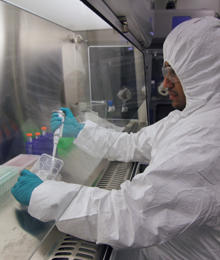An interview with Dr Sam Stephen
January 2020
Dr Sam Stephen studied recombinant viral medicine at the Universities of Kerala, Oxford and Cologne on and carried out his postdoctoral research at University College London (UCL) and the University of Leeds. He is currently viral vectors senior scientist at the Centre for Process Innovation (CPI). Alongside collaborating authors, Dr Ruth Stephen (Affirm Medical Communications) and Dr Jonathan Welsh (AstraZeneca), they discuss why microbiology is essential to vaccine development.

Why is vaccine production important?
The modern system of vaccination was introduced by Edward Jenner, and after more than a century of advances in microbiology, the system has been refined to a high level. Vaccines directed against various diseases found their origin in academia, with stalwart scientists sometimes paying the ultimate price for their dedication.
As the need for vaccines and the complexity of vaccines both increase, industry has been increasingly getting involved in the fight to help contain and eradicate diseases.
How has vaccine production evolved?
Currently, vaccines can be developed as sub-particle, denatured, live-attenuated, virus-like particle and viral-vectored vaccines. In industry, vaccines are usually generated in mammalian, yeast or bacterial cells in Good Manufacturing Practice (GMP) facilities. Historically, egg-based production had been used, but for safety and reproducibility reasons, the production is now moving more to cell-based methods. Scale-down methods are used to identify the optimal conditions for growth and production and the process is locked down prior to the scale-up for production in bioreactors. High-throughput and small-scale methods are then used to identify the ideal conditions for purification, which are used to purify large quantities of the product.
The key indicator of success at this stage is the production of highly immunogenic, pure material. The ideal formulations that protect the vaccine and enhance the immune response are selected along with the best methods to store and transport the product, and this might change according to the geographical location of where the vaccine is intended for.
The vaccine is characterised using stringent quality controls, in accordance to regulations; for example, to the International Council for Harmonisation of Technical Requirements for Pharmaceuticals for Human Use (ICH) and Food and Drug Administration (FDA) guidelines; and is analysed for process impurities, presence of raw materials, toxicity, adventitious and replication-competent viruses, aggregation and potency prior to use in subjects.
Why is microbiology important in order to understand how vaccines work?
A good background in microbiology is essential to the development of vaccines. The recent spread of a novel coronavirus and the spread of Ebola demonstrate the need for better vaccines.
The kern of industrial production is based on the sterling work carried out on microbiology in academia. This helps to identify crucial epitopes and provides the basic knowledge for growth of vaccine-producing cell/vector. This helps the industry to develop strategies to generate vaccines and viral vectors at a fair cost and high efficacy.


